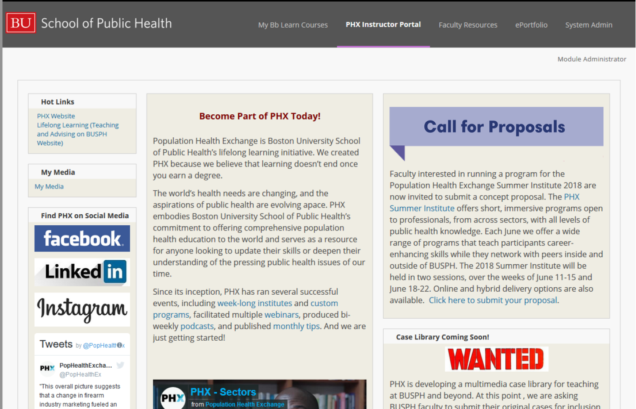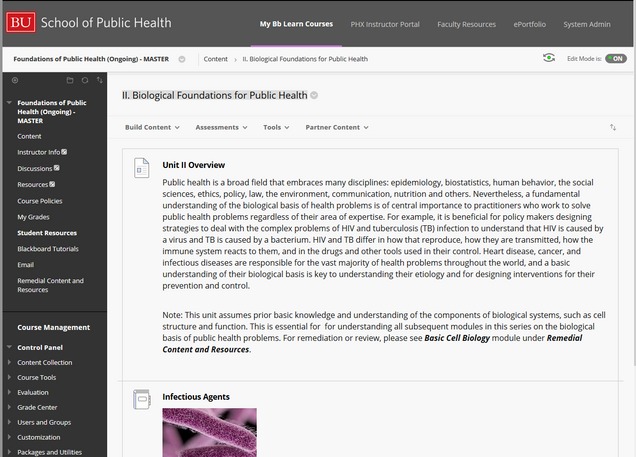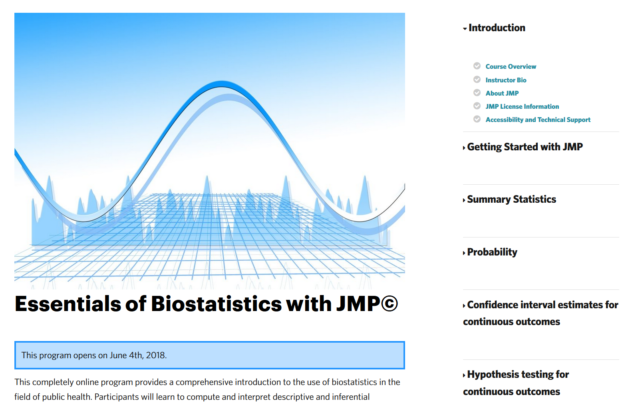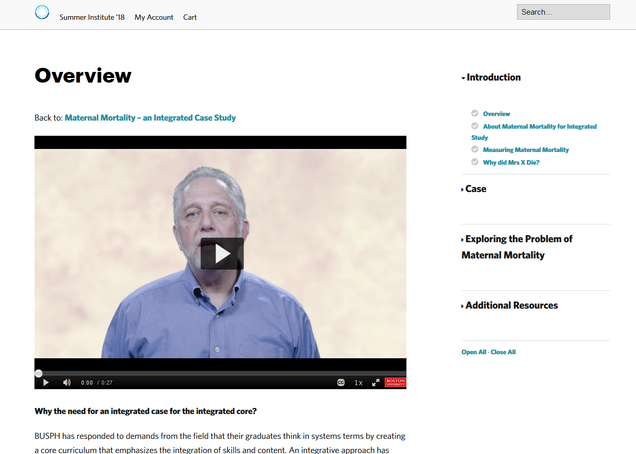Online Courses.
loading slideshow...

PHX Instructor Portal in Blackboard

Foundations of Public Health course in Blackboard

PHX Participant Portal - short, non-credit course platform

Essentials of Biostatistics with JMP - a fully online, short, non-credit program

Maternal Mortality - integrated case study
What is an Online Course at SPH?
BUSPH aims to expand its offering of online and hybrid courses. These include graduate level, for-credit courses in our degree and certificate programs, as well as short, non-degree programs designed for continuing education and lifelong learning.
Although each course is unique and delivery strategies will largely depend on the stated objectives, online delivery may include:
- Recorded lectures with or without added interactivity
- Video
- Readings
- Discussions (including social media)
- Group projects with options for live video conferencing
- Case Studies
- Self-directed learning
- Assessments
Who can teach online courses?
BUSPH faculty of any academic rank are welcome to apply to develop and teach online in both for-credit and continuing education realms. Although experience teaching online is helpful, it is not required. Depending on the need, training will be provided either in-house (through the Office of Lifelong Learning) or by one of our partners throughout BU.
I have an idea for a short online course. What do I do next?
PHX offers short, non-credit fully online courses on a variety of topics related to public health. Courses generally take 8-10 hours to complete and target adult audiences across disciplines. Faculty wishing to develop a PHX course can submit proposals to Director of Lifelong Learning Leslie Tellalian at ltellal@bu.edu. Proposals should contain the following information:
- Author bio, credentials/ qualifications and contact information
- Course title
- Short description, including format, purpose and intended audience
- 5-7 learning outcomes
What does course development look like?
If you would like to convert an existing traditional for-credit course for a fully online or hybrid delivery, please contact the Office of Lifelong Learning (OLL) at phx@bu.edu. You will meet with a digital learning designer to review learning outcomes and assessments, and to discuss any necessary changes to teaching strategies. We will also discuss any training and support you may need and provide a “sand box” course shell in Blackboard.
In some for-credit courses, content lends itself well to a shorter non-credit version. Non-credit programs are hosted in WordPress and are developed entirely by OLL staff from materials provided by the faculty.
If your course is part of a degree or certificate program that is being converted to an online format, its development may be managed by the Office of Distance Education (ODE). In that case, you will be asked to meet with ODE staff and commit to a timeline. Although you will be expected to provide content according to the agreed upon timeline, the course will be built in Blackboard by ODE staff.
What does a short online course look like?
PHX strives to develop high quality products for lifelong professional development through evidence-based best practices in teaching and learning. Consistent with the principles of Universal Design for Learning (UDL), PHX courses encompass multiple modalities of content delivery and assessment of learning. In addition, every effort is made to ensure accessibility and usability of all content. In order to achieve a consistent look and feel, all content is produced and assembled with the help of a Digital Learning Designer.
Content Delivery Options:
- Narrated PowerPoint presentations
- Video lectures with or without built-in interaction
- Screencasts/podcasts
- Readings
- Links to websites
- Embeddable objects – flash cards, games, etc.
Assessment Options for Self-Paced (non-Moderated) Courses:
- Quizzes (automatically graded) include multiple choice, multiple answer, short answer, matching, etc.
Assessment Options for Moderated Cohort-based Courses:
- Essay assignments
- Projects
- Collaborative Wikis
- Discussions
Faculty are invited to propose and discuss other innovative ways to deliver content and assess learning.
Note: To promote an inclusive digital environment, PHX courses will follow best practices as outlined in Quality Matters Rubric for Continuing and Professional Education and WCAG AA Accessibility Guidelines. In particular, special attention will be given to:
- Closed captioning of all prerecorded video/audio content
- Equivalent (text-based) alternatives to auditory and visual content
- Consistency in navigation
What tools are available to me when developing and teaching an online course?
Blackboard
Bb is a learning management platform that will be used to host all for-credit courses.
LifterLMS
Lifter LMS is a Word Press plug-in used to host short non-credit programs and multimedia case studies. This platform allows users outside of BU to browse, pay and self-enroll in all PHX non-credit offerings.
Articulate Storyline
This tool is used by OLL staff to create interactive learning objects that are then embedded in Bb. Narrated PowerPoint presentations produced by faculty are a great place to start. Video, images, animation, quizzes/polling, branched scenarios and other types of enhancement and interaction can be added as well. Faculty will work closely with OLL staff to produce materials using this option.
Kaltura
Kaltura is a screen casting tool that is available to all faculty and staff at BU either at https://mymedia.bu.edu/ or from within Bb. Kaltura’s CaptureSpace tool ties multiple input options (computer screen, webcam and audio) into one recorded object. The advantages of Kaltura over other screen casting options include a shared repository, ability to create video quizzes, easy embed option in Bb and usage analytics.
ECHO360/ALP
Similar to Kaltura, ECHO360 is a screen casting tool that combines multiple inputs into one object. However, its Active Learning Platform (ALP) provides additional options to engage learners, such as note taking, ability to ask questions and mark specific areas of content as confusing, participate in discussions, quizzing/ polling and usage analytics. ALP is available for use with current BU students only and requires a Kerberos account to access.
Note: Both Kaltura and ECHO360 can be used to narrate PowerPoint presentations. However, it is sometimes easier to record individual slides directly in PPT and use Articulate to convert presentations later. Kaltura and ECHO360 work best for recording live lectures that require minimal editing. If choosing to record in a different setting, transcripts should be prepared before recording to minimize errors.
Godley Media Room
This well-equipped media production room is available for all recording and video editing needs. The room provides several cameras for use cases where multiple angles are required, green screen, prompts and more. Workstations include ECHO360, Kaltura, as well as more powerful editing tools, such as Camtasia, Adobe Premiere and After Effects.
Lynda.com
Lynda.com is an extensive database from Linkedin of high quality training videos on a wide variety of topics. BU does not presently have a site-wide subscription, therefore (in courses that would utilize this tool) students would be required to purchase their own subscription as needed.
3PlayMedia
This service provided transcription and closed captioning for video and audio content. Additional services include video player templates with interactive transcripts, embedded open captions and more.
XANEDU
Since some of the students will not have access to BU (or other) library resources, it is recommended – in addition to providing citations, to put together an optional digital course pack that students can access for a separate fee. This will clear copyright and make materials more affordable than purchasing individually.
Note: there is a vast variety of free and low cost platforms/tools/apps that can be used for developing/teaching an online course. Please contact OLL for more information.